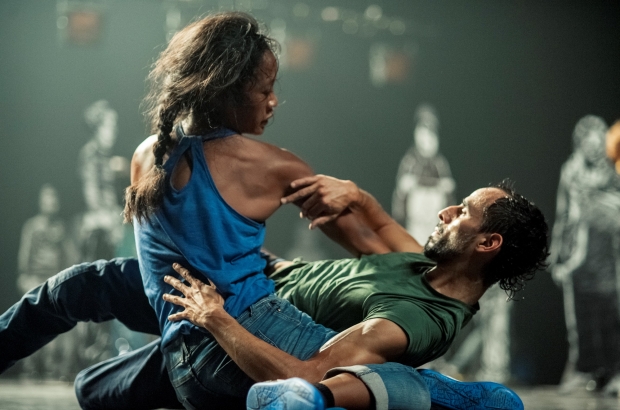- Daily & Weekly newsletters
- Buy & download The Bulletin
- Comment on our articles
Culture Beat: 15 January
Performances from and about Tunisia come to Bozar in a mini-festival organised by Moussem, a “nomadic arts centre” focused on the Arabic world. The idea of the event is to explore the role the arts can play in Tunisia’s new, still-fragile democracy and to showcase work by Tunisian performers. Join the Revolution, conceived by Ghent-based performance group Action Zoo Humain, which stages a crowd-funding campaign to preserve just one piece of Tunisian culture from destruction. Along the way it combines music, dance, song and speech (in Dutch and French). The legacy of oppression in the Arab world is examined in What the Dictator Did Not Say, a monologue by Tunisian dramatist Meriam Bousselmi. Performed in French by Lassaad Jamoussi, it shows a deposed dictator reproaching the population for turning against him. Turning to the revolution itself, choreographers Aïcha M’Barek and Hafiz Dhaou give a personal interpretation of Stravinsky’s Rite of Spring. Surrounded by cardboard figures representing people killed in the struggle, the dancers rediscover and celebrate the freedom to move their bodies (pictured). The festival concludes with a concert by veteran singer and oud player Lotfi Bouchnak, whose repertoire ranges from classical Arabic music to rap.
15-16 January at Bozar
The Brussels Jazz Orchestra and Brussels-born jazz singer David Linx pay tribute to Belgium’s most revered songwriter with a concert of Jacques Brel classics. Brel may have died nearly 40 years ago, but tunes like “Ne me quitte pas” and “Marieke” continue to inspire music-lovers young and old. Even Belgium’s most recent pop export, Stromae, owes a stylistic debt to the ironic, literate Brel. Most of the songs in BJO’s tribute concert are sung in the original French, but the set includes the English version of “Amsterdam” popularised by Scott Walker and David Bowie. The performance premieres in Flagey before touring across Flanders.
20 January, 20.15 at Flagey
Now in its second edition, Flagey’s Brussels Jazz Festival picks up where its predecessor, the Winter Jazz Festival, left off. The event boasts a fortnight of midwinter concerts at one of the capital’s most popular jazz and classical music venues. Among the festival’s highlights is Antwerp-based quartet Les Blauw (15 January). Inspired by the gypsy swing of mid-century Franco-Belgian guitarist Django Reinhardt, the music of Les Blauw celebrates a time of musical ferment, a time when political ferment and cross-cultural dialogue yielded exciting new art forms.
13-23 January at Flagey
With its scenic city hall and myriad monuments, Brussels’ city centre is selfie paradise. A new exhibition, sponsored by Japanese camera manufacturer Nikon, gives visitors more reasons to take pictures of themselves. Here you’ll find life-sized, ready-made scenes just waiting for you to step in and snap away. If some of the seascapes look familiar, it’s because Nikon 3D World Magic & Fun is a regular attraction on the Flemish coast in the summertime. Ambitious selfie artists can submit their favourite shots to Nikon for the chance to win a camera.
Until 3 April at Cinema Galeries
The Dialogue Series: IV Moya is the result of an intimate conversation between celebrated Congolese choreographer Faustin Linyekula and South African dancer Moya Michael, a vulnerable and honest solo performance about what it means to be “coloured” in Johannesburg, Kisangani or Brussels.
21-23 January 20.30, KVS, Quai aux Pierres de Taille 9, Brussels
Modernika: Belgian Dream of an American city is an architectural exploration of the ways in which the “American Dream” developed in post-war Belgium, when consumer society flourished and cities were (re)designed with a bias towards large, functional complexes and the idealised “vertical city”.
Until 10 April, Atomium
Ta.bu is an exhibition exploring taboos, bans, proscription and censorship, their origins and how some taboos are losing force while others are growing stronger.
Until 26 March, Maison Particulière, Rue du Châtelain 49
The Fine Arts Museum presents an exhibition of about 90 drawings from 16th and early 17th-century Low Countries artists from a Belgian private collection, including work from masters such as Frans Floris and Peter Paul Rubens. Most of the drawings have never been on public display before.
20 January-15 May, Royal Museums of Fine Arts
Works by the British writer, artist and filmmaker Andrew Kötting, from film and video fragments to installations and avant-garde theatre, can be seen at Cinema Nova, including an exclusive screening of his latest film, By Our Selves, a tribute to British poet John Clare.
14-21 January, Cinema Nova, Rue d'Arenberg
Photo: Blandine Soulage









